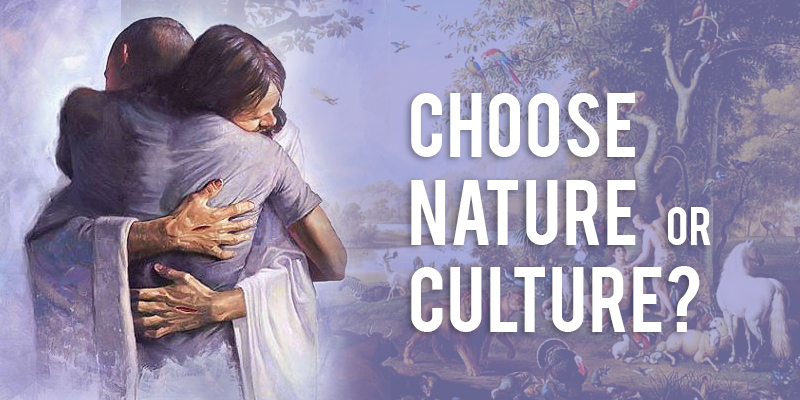
Choose Nature or Culture?
It is said that all the living beings are on the move in constant search either for food or for the sex partner. Human being, as we know, in his original natural simplicity participates in the same instinctual tendencies of the other living beings. Although we hide our basic instincts with the vestments of culture, yet most often they are the governing forces behind every dynamism. In the history of humanity, we also observe how the instinctual drives for a minimum satisfaction is degenerated into avarice and greed. Some people declared their culture to be the superior one and brutally destroyed the others looting the fruits of their culture. Is culture a hypocrisy and a cunning instrument of envy and greed? Is it an instrument of the fittest to insure the satiation of their basic needs at the cost of others? Shall we choose nature or culture?
In the story of paradise, we see the original beauty and prosperity of the nature. It was full of fruits and all were sharing their fruits to one another. Nobody was hiding or hoarding anything for personal interest and it was a nature of honesty and transparency. We are at a loss to pin point that unfortunate moment when one being began to haunt the other for its satisfaction and survival. The author of the creation narratives tried to address this question and said that envy and greed destroyed the beauty and equilibrium of the nature. Probably the problem of some scarcity caused fear and anxiety in the nature and ended up in envy and greed. The present reality is that the nature lost its equilibrium and is suffering a great crisis endangering even its existence. In this situation to choose the present nature means to participate in its destruction. The people of good will were praying and working hard for a new style of life, a new culture, to re-establish the original beauty and prosperity of the nature.
In the fullness of time a new humanity was born in the history and he said: ‘come to me, all who labour and are heavy laden, and I will give you rest’. (Matthew 11, 28) He introduced a new culture by his life and teachings and said: ‘Take my yoke upon you, learn from me; for I am meek and humble of heart, and you will find rest for your souls. For my yoke is easy, and my burden is light’. (Matt 11, 29-30) The Acts of the Apostles reports that the ancient Christian communities actualized the new culture that Jesus proposed and in those communities they experienced the original beauty and prosperity of human nature: “And all who believed were together and had all things in common; and they sold their possessions and goods and distributed them to all, as any had need. And day by day, attending the temple together and breaking bread in their homes, they partook of food with glad and generous hearts, praising God and having favour with all the people.” (Acts 2, 44-47)
In the Book of Genesis (Genesis 2, 18-24) and in the Gospel of Mark (Mark 10, 2-16) we hear about the unity and indissolubility of marriage. The Church unites a man and a woman in the name of God with the Sacrament of Marriage to live in profound communion with each other by unconditional mutual donation and bring up the fruits of their love for the glory of God and for the good of all people. By their word and example, the parents instruct the children to grow in faith hope and love so much so the children respect their life and the life of others. The community of faithful help the children to discipline themselves according to the culture of the new humanity introduced by Jesus Christ. As a result, the children become real representatives of the new humanity participating in the peaks of human excellence, the fragrance of human life by learning and study. They participate in the poverty of the brethren by living a simple life.
Instead of thinking much about the aberrations of the man-woman relationships of today let us concentrate on our duty to grow into the fullness of human life being disciplined by the new culture introduced by Jesus Christ and produce the fruits of the new humanity. Following the new culture of mutual donation, we can overcome the scarcity of love among us which generate envy and greed and we can grow to self-confidence and generosity. When all are preoccupied with feeding others from their fullness, we discover the original beauty of our nature. Since there are problems of growth and health in persons because of some scarcity somewhere, all are invited to take up the yoke of the new humanity which is light and easy to carry because it is accepted in love. Therefore, we choose nature but with the new culture of Jesus Christ.